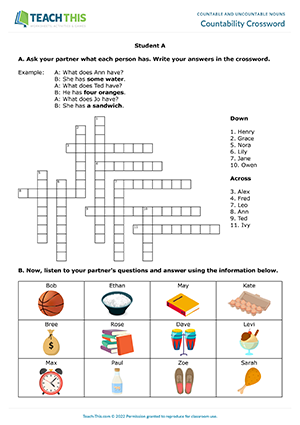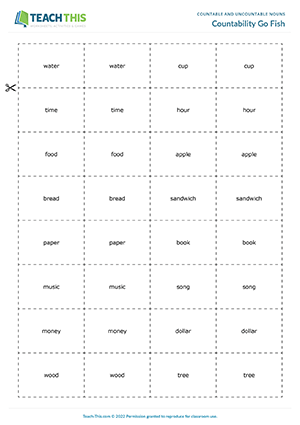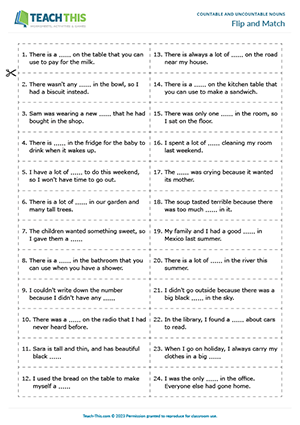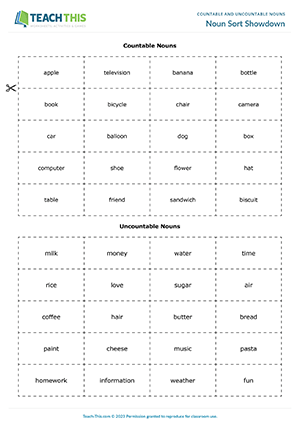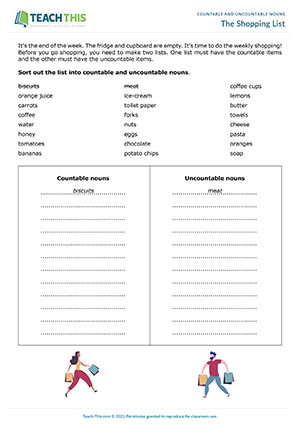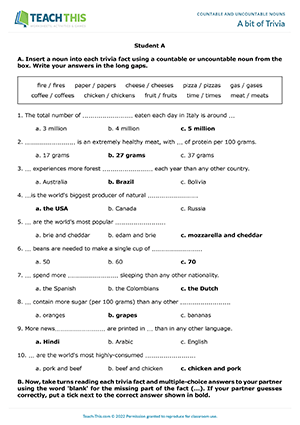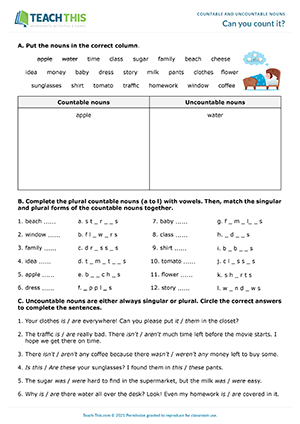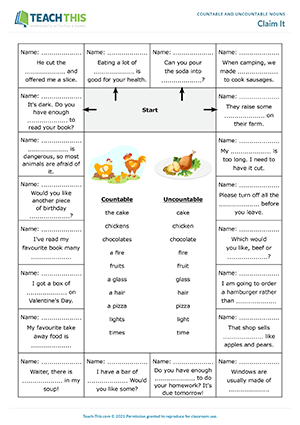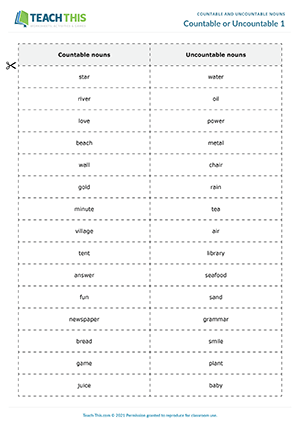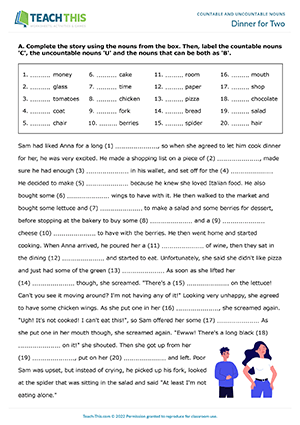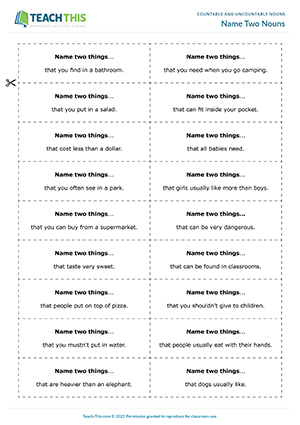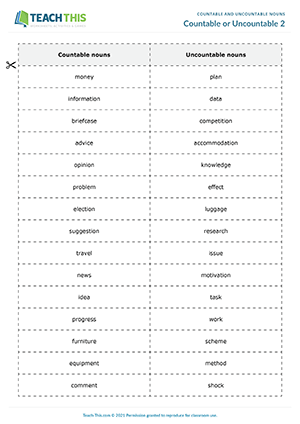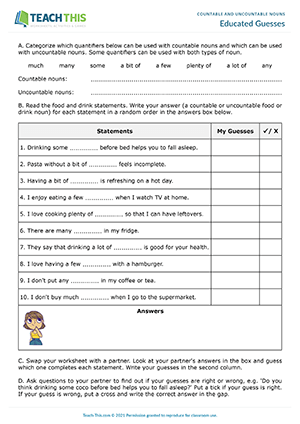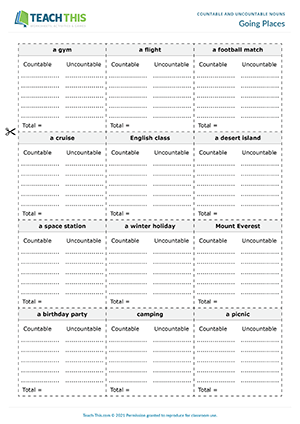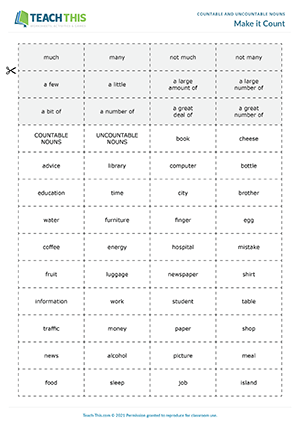In this countable and uncountable nouns speaking activity, students complete crosswords with countable and non-countable noun phrases. Student A starts by asking their partner what various people have by looking at the names in the crossword clues, e.g. 'What does Ann have?' Student B answers by looking at the corresponding name and picture in their chart, paying close attention to countability and number. If the noun in the picture isn't countable, the student says some followed by the noun. If the noun is countable and there is only one, the student says a or an. If the noun is countable and there is more than one, the student says the number. Student A then writes the answer in their crossword, including some, a, an or a number. When Student A has completed their crossword, the two students swap roles.
In this fun countable and uncountable nouns game, students practice asking for nouns and responding to the requests. In groups, students take it in turns to ask another group member if they have a particular noun word card, e.g. 'Do you have any cups?' The group member then responds yes or no accordingly. If the group member has one or more cards with the word, they give them to the student and draw an equal number of cards from the pile. If not, the student takes one card from the pile. When a student gets four cards with the same word, they place the set face-up on the desk in front of them. The student with the most matching sets of cards at the end of the game is the winner.
Here is a free countable and uncountable nouns game to help students practice using countable and uncountable nouns in sentences. In groups, students take turns turning over one sentence card and one word card. Each word card contains a countable noun and an uncountable noun. If the countable or uncountable noun completes the sentence, the student reads the sentence aloud using the correct noun only. If the other group members agree that the noun matches the sentence, the student underlines the noun and keeps the pair of cards. If the cards don't match, the student turns them back over, keeping them in the same place. Afterwards, check the answers as a class. Students score themselves one point for each correctly underlined noun. The student with the most points in each group wins.
In this handy countable and uncountable nouns game, students practice categorising and forming sentences with countable and uncountable nouns. A member of Team A comes to the front of the class and stands at a line with a ball. Call out a noun on a card. e.g. apple. Without talking to anyone, the team member tries to throw the ball into a labelled container based on whether the noun is countable or uncountable. If the ball goes into a container, ask the class to confirm whether the ball is in the correct one. If it is, the student scores a point for their team. For an extra point, the team member then tries to make a sentence using the countable or uncountable noun. If the ball lands in the wrong container or misses both containers, no point is awarded. Then, invite a member of Team B to the front of the class, and so on. The game continues until all the cards have been used. The team with the most points at the end of the game wins.
This useful countable and uncountable nouns worksheet helps to teach students how to differentiate countable nouns from uncountable nouns. First, students write a list for their weekly grocery shopping by sorting a list of countable and uncountable nouns into their two groups. When the students have finished, check the answers with the class. As an extension, students add five more items to each list.
In this engaging countable and uncountable nouns game, students insert countable and uncountable nouns into trivia facts and then quiz a partner to complete the facts from multiple-choice answers. First, students insert a noun into each trivia fact using a countable or uncountable noun from a box. Next, students take turns reading each trivia fact and multiple-choice answers to their partner using the word 'blank' for the missing part of the fact. If their partner guesses correctly, the student puts a tick next to the correct answer shown in bold. The student with the most correct guesses at the end of the game is the winner.
This free countable and uncountable nouns worksheet helps students learn and practice singular and plural forms of countable and uncountable nouns. Students begin by categorizing nouns, according to whether they are countable or uncountable. Next, students complete plural countable nouns with vowels. Students then match the singular and plural forms of the countable nouns together. Students then move on to circle correct answers to complete sentences containing singular and plural uncountable nouns. After that, students do an error correction exercise to practice the singular and plural forms of both countable and uncountable nouns. In the last exercise, students choose multiple-choice answers to complete a set of sentences.
In this entertaining countable and uncountable nouns board game, students race to claim squares by completing sentences with similar countable and uncountable nouns. Students take turns rolling the dice and moving their counter along the board. Students can move around the board in any direction, but cannot change directions in the middle of a turn. On their first turn, students move off the start square following any of the arrows before proceeding either clockwise or counterclockwise. When a student lands on a square, they complete the sentence with a countable or uncountable noun from the board and read the sentence to the group. If the group agrees the sentence is correct, the student writes their name and the correct answer in the square. It's then the next student's turn to play. The game ends when all the squares have been claimed. The student who claimed the most squares is the winner.
This rewarding countable or uncountable nouns game helps to teach students the difference between these two types of nouns. The game also helps students associate quantifiers and question words with each type of noun. In pairs, students take it in turns to turn over a noun card and place it under a countable or uncountable noun heading. Pairs score one point for each correctly matched noun. Pairs then race to win an extra point by making a meaningful sentence or question with the noun using a question word or quantifier from the board. The first pair to do this wins an extra point. The pair with the most points at the end of the game wins.
Here is a comprehensive countable and uncountable nouns worksheet for pre-intermediate students. First, students complete a story using countable and uncountable nouns from a box. Students then label the countable nouns 'C', the uncountable nouns 'U' and the nouns that can be both as 'B'. Next, students complete sentences using the nouns marked 'B'. After that, students complete sentences using nouns that are either uncountable or both countable and uncountable. Lastly, students think of two categories and write down three countable or uncountable nouns associated with them. Students then read the nouns to a partner who tries to guess the categories and adds two more nouns of their own to each one.
In this creative countable and uncountable nouns game, students race to say two countable or uncountable nouns belonging to different categories. In groups, students take it in turns to pick up a card and read the prompt to the group, e.g. 'Name two things that you find in a bathroom'. To determine whether the answers need to be countable or uncountable, the student then rolls a dice. If they roll an odd number, the nouns must be countable. If they roll an even number, the nouns must be uncountable. As soon as the number is shown on the dice, students start thinking of two answers. When a student has two nouns, they pick up the dice and say their answers. If the other students agree that the nouns are correct and suitable for the category, the student wins and keeps the card. If not, the student puts down the dice and is out of the round, giving the other students a chance to answer. The student with the most cards at the end of the game is the winner.
This enjoyable countable or uncountable nouns game can be used to teach students more advanced countable and uncountable nouns and which quantifiers and question words to use with each type of noun. In pairs, students take turns turning over a noun card and placing it under a countable or uncountable noun heading. Next, elicit the correct category for each noun from the class. For each correctly matched noun, pairs score one point. Pairs then race to score an extra point by making a meaningful sentence or question with the noun using a question word or quantifier from the board. The first pair to do this scores an extra point. The pair with the most points at the end of the game is the winner.
Here is a free countable and uncountable nouns game to help students practice using countable and uncountable food and drink nouns with quantifiers. First, students categorize which quantifiers can be used with countable nouns and which with uncountable nouns. Next, students read ten food and drink gap-fill statements and complete each statement with a true answer (a countable or uncountable food or drink noun) by randomly writing each answer in a box. After that, students swap worksheets with a partner. Students look at their partner's answers and guess which one completes each statement, writing their guesses on the worksheet. Afterwards, students ask questions to their partner to find out if their guesses are right or wrong, e.g. 'Do you think drinking some coco before bed helps you to fall asleep?' The student with the most correct guesses in each pair wins.
In this imaginative countable and uncountable nouns game, students race to write lists of countable and uncountable nouns for things they need in different situations. Give each pair of students a copy of the first card (a gym). Students brainstorm five countable and uncountable items they might need to take with them and write the nouns under the two headings on their card. The first pair of students to complete their card with five countable nouns and five uncountable nouns scores ten points. After a winning pair has given their answers, the other pairs of students score their cards. Pairs receive one point for every appropriate and correct answer. Then, give out a new card, and the game starts again. The pair with the highest score at the end of the game wins.
This memorable countable and uncountable nouns game is ideal for practicing or reviewing countable and uncountable nouns and their use with quantifiers. In groups of three, students take it in turns to turn over a noun card and place it under a countable or uncountable heading. Each time a student puts a noun under its correct heading, they score one point. When the students have correctly matched all the noun cards, they take it in turns to turn over a quantifier card and make a sentence with one of the nouns on the table. If a student manages to make a grammatically correct sentence with the quantifier and chosen noun, they keep the noun card and score a point. If not, play passes to the next student. The student with the highest score from the two games wins.
Latest Free
Resources
- Everyday Objects Bingo
Everyday Objects
Elementary (A1-A2)
- Action Verb Races
Actions
Elementary (A1-A2)
- Birthday Basics
Birthdays
Elementary (A1-A2)
- Sales Phrasal Verbs
Business Phrasal Verbs
Upper-intermediate (B2)
Latest Member
Resources
- Collocations at Work
Business Collocations
Intermediate (B1)
- Etiquette Trivia Board Game
Etiquette and Manners
Upper-intermediate (B2)
- Everyday Objects Vocabulary
Everyday Objects
Pre-intermediate (A2)
- Let's have a talk
Verb-Noun Collocations
Pre-intermediate (A2)



